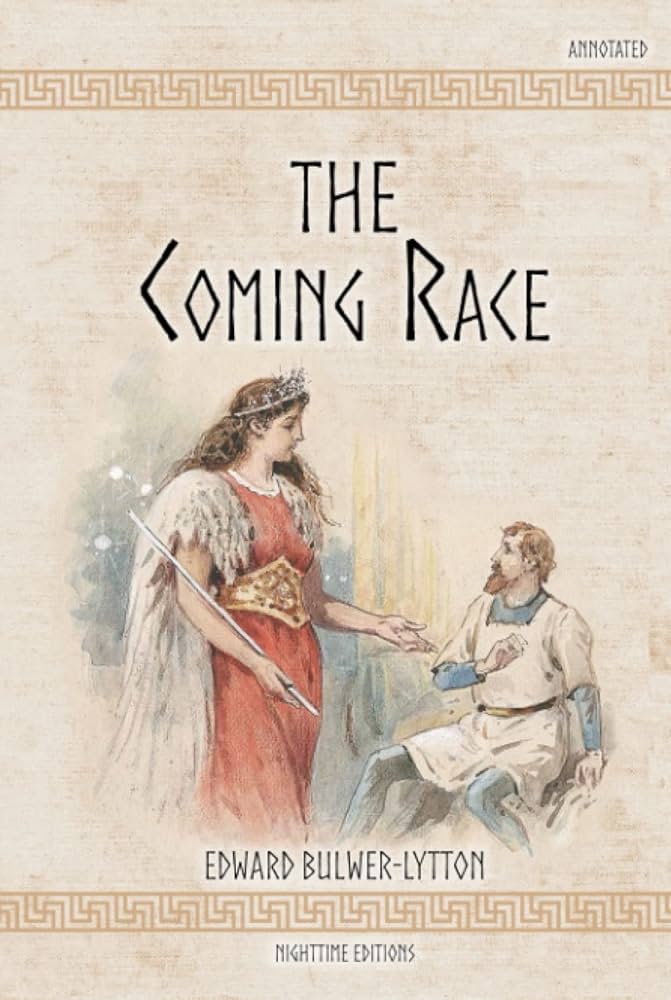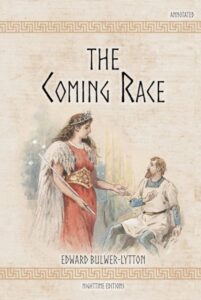Chapter XXIV — The coming Race
byChapter XXIV begins not with sorrow, but with an invitation—a child requests Aph-Lin’s presence at the funeral of a relative. I, sensing the weight of a possible encounter with Zee, ask to join. My motives are mixed: part curiosity, part avoidance, yet mostly driven by the chance to understand how this extraordinary society embraces something all living beings must face—death. Their tone, from the start, is not mournful. In place of grief, there is readiness. Death here is not shunned but welcomed, especially when one has lived long and well.
We arrive at the home of the departed, where guests gather not in hushed sorrow but in warm reflection. The body, resting on a couch, appears untouched by pain. A smile plays on his lips, peaceful and whole, not worn by age or illness. He had passed after dreaming of his beloved wife, whom he longed to meet again. That dream was taken as a sign. Among these people, death isn’t sudden or feared—it is accepted as part of a graceful exit. The moment felt unfamiliar, but strangely comforting. No tears fell, yet respect filled the room like incense.
A nearby device, unlike anything I have seen, quietly emits a deep, fragrant aroma. Its surface is smooth and dark, with glowing red lights flickering through tiny circular vents. It isn’t spoken of directly, but its presence dominates the room. I assume it has a purpose related to the body, though no one treats it as mysterious. Its subtle hum blends into the atmosphere. There is no coffin, no grave, no finality. Their technology embraces death as another process, not a dramatic end. The emphasis remains on celebration, not on loss.
As the town’s melodic chimes echo in perfect harmony, the ceremony begins. Gentle music rises—not the kind meant to draw out sorrow, but rather to invite joy. It’s soft, vibrant, and alive. The air shifts as if warmed by memory, and faces glow with a collective calm. They do not sing dirges. They sing renewal. Their belief in an afterlife isn’t symbolic; it’s structural. The dead are not remembered for their absence, but honored for their continuation into something better.
The ceremony is public, yet profoundly personal. No words are forced. No roles are assigned. Everyone participates as moved by feeling, not tradition. What struck me most was the honesty of it. There is no pretending, no dramatic expressions. Each person speaks to the departed as though he’s only gone ahead by a few steps. Children are not shielded, nor are elders treated with tired pity. Their unity in facing death grants dignity to the deceased and strength to the living.
Aph-Lin later explains that the body will be given to natural forces through methods guided by vril energy. There is no burial, no cremation, only an elegant return to the elements. The body, through their science, is converted safely and silently into pure energy, absorbed into the Earth or air. It’s not destruction, but release. The process, he says, avoids decay and honors life’s cyclical nature. Their practices reduce fear by removing the unknown. I found this approach surprisingly humane, though my mind struggled to let go of earthly customs.
The ceremony closes with a gesture of parting—a hand laid gently on the brow, a moment of silence, and a final note in the air. There are no funeral processions, no grief-stricken declarations. The people quietly disperse. I leave with Aph-Lin, my thoughts heavier than I expected. I do not weep, but I feel something stirring within me—a kind of envy. Not for their power, but for their peace. Death, which terrifies my kind, has become to them a bridge.
Reflecting on the day, I find myself questioning my own culture’s treatment of death. We resist it, dress it in fear, and veil it in sorrow. But perhaps that is because we are unsure of what lies beyond. The Vril-ya are not uncertain. Their conviction is rooted in belief, but guided by knowledge. They do not just hope; they know—or believe they do. That clarity gives them serenity. As I prepare for sleep, I wonder if it is clarity we lack more than courage.
There’s a deeper lesson in what I’ve seen. Technology here does not replace tradition; it reshapes it with meaning. Faith and science are not at war, but in harmony. The death I witnessed was not only the end of a life, but the continuation of values—love, dignity, community, and belief in something greater. In the end, perhaps that is what matters most. Not how we die, but how we live toward that moment. In their world, death teaches not despair, but balance. And in observing them, I begin to understand how little we’ve done to make peace with the inevitable.


